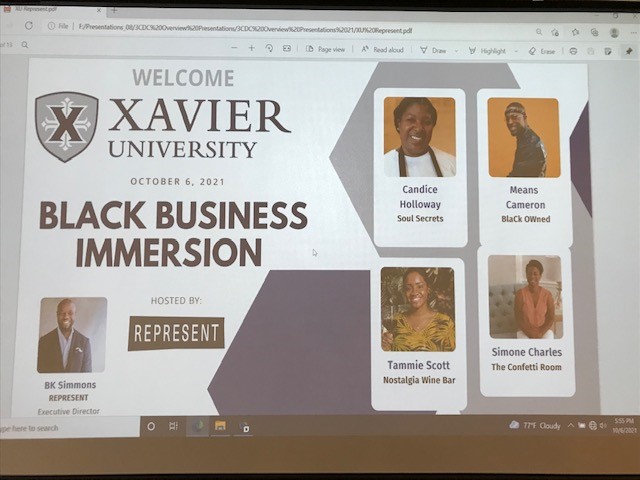Marketing 310: Economic Inclusion in B2B Marketing

Professor Karen Eutsler
When Professor Karen Eutsler began teaching Marketing 310, Business to Business Marketing, she knew that she wanted to highlight supplier diversity programs as part of her course content. After further research, she wanted to expand students’ complete understanding of economic inclusion, but decided to do so with community-based experiences that better animated these concepts that leveraged voices outside of the classroom. Students in Eutsler’s class discuss foundational readings on economic inclusion, engage with guest speakers, and participate in a course-based simulation where they assume personas of business professionals involved or challenged because of issues of inclusion.
“I knew it would be better for their experience to be immersed beyond a classroom discussion. If I could get business students in front of people who were actually walking the walk - who are entrepreneurs and are working to move the needle on economic inclusion in the business community,” she explains.
To prepare for the simulation this semester, students participated in an a half-day immersive learning experience coordinated by the Eigel Center and hosted by a new, innovative nonprofit, Represent. Represent was formed by a collaborative of developers with an economic footprint in the burgeoning neighborhood of Over the Rhine. These commercial and residential stakeholders noted that after a decade of significant investment in the once marginalized neighborhood, its transformative growth is not equitably distributed and there is a need for an infrastructure to support successful, diverse business representation in this neighborhood adjacent to the Central Business District.
For their immersion, students met in the heart of the neighborhood with Represent’s Executive Director, Bjorn Simmons, and a panel of several Black-owned business owners. Simmons advised the students that less than 13% of businesses in OTR are Black-owned. Represent, he noted, is creating pathways to entrepreneurship for Black business owners so they can build wealth and attract more diverse customers back into the neighborhood. The panel candidly shared the challenges they faced as they grew their own business and the hurdles to raising capital, establishing banking relationships and building credit, and opening and maintaining a storefront in one of the region’s pricier rental markets. Students were able to engage the panel with questions, and then led on a tour that highlighted several established diverse businesses in the neighborhood, followed by dinner and reflection. Senior Marketing and Psychology double major, Mason Southwood, reflected back on the semester and the importance of growing businesses in a community equitably:
“I enjoyed our in-class discussions, immersive learning experiences, and all the content that correlated to the social justice issues around economic inclusion. The opportunity and knowledge that minority and black owned business owners need in order to grow should be a point of emphasis for our country as we continue to move forward,” he notes.
According to Professor Eutsler, MKTG 310 aims to bring relevant social justice issues into the Marketing major in a way that students do not immediately expect. She notes:
“Students expect to engage with these issues in Philosophy and Theology, but they don’t get that engagement in business very often. Since being business professionals are what they are going to be for two-thirds of their life, I think social justice has to be part of their business acumen and the way they see the business world.”